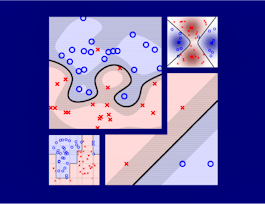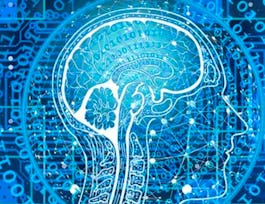The course "Applied Machine Learning: Techniques and Applications" focuses on the practical use of machine learning across various domains, particularly in computer vision, data feature analysis, and model evaluation. Learners will gain hands-on experience with key techniques, such as image processing and supervised learning methods while mastering essential skills in data pre-processing and model evaluation.



Applied Machine Learning: Techniques and Applications
This course is part of Applied Machine Learning Specialization

Instructor: Erhan Guven
Sponsored by Coursera Learning Team
Recommended experience
What you'll learn
Understand and implement machine learning techniques for computer vision tasks, including image recognition and object detection.
Analyze data features and evaluate machine learning model performance using appropriate metrics and evaluation techniques.
Apply data pre-processing methods to clean, transform, and prepare data for effective machine learning model training.
Implement and optimize supervised learning algorithms for classification and regression tasks.
Details to know

Add to your LinkedIn profile
12 assignments
September 2024
See how employees at top companies are mastering in-demand skills

Build your subject-matter expertise
- Learn new concepts from industry experts
- Gain a foundational understanding of a subject or tool
- Develop job-relevant skills with hands-on projects
- Earn a shareable career certificate


Earn a career certificate
Add this credential to your LinkedIn profile, resume, or CV
Share it on social media and in your performance review

There are 5 modules in this course
Explore the practical applications of machine learning through hands-on modules covering data pre-processing, feature extraction, model evaluation, and supervised learning techniques. Delve into specialized topics such as computer vision and learn to implement and assess various machine learning models. This course combines theoretical insights with practical lab activities to equip you with essential skills in applied machine learning.
What's included
2 readings
Discover the foundational principles and practical applications of machine learning in the field of computer vision. This module covers essential concepts, including data preprocessing, dataset management, classification techniques, and model evaluation, providing a comprehensive introduction to applying machine learning to visual data.
What's included
5 videos2 readings3 assignments1 ungraded lab
Explore essential techniques in data feature analysis and model evaluation critical to effective machine learning applications. Learn to identify, preprocess, and integrate datasets from diverse sources like UCI KDD and Kaggle. Gain hands-on experience with the Weka framework for data preprocessing and classification, and understand evaluation metrics including Receiver Operating Characteristic curves. By the end of this module, you'll grasp the nuances of model overfitting and strategies to optimize model performance.
What's included
7 videos2 readings3 assignments1 ungraded lab
Master the essential techniques of data pre-processing to enhance machine learning model performance. This module covers the foundational aspects of data cleaning, various data formats, and processing methods. You'll delve into advanced topics like discretization, data transformation, and reduction techniques. By the end of this module, you'll be adept at engineering data features, applying feature selection, and refining datasets for optimal machine learning outcomes.
What's included
5 videos1 reading3 assignments1 ungraded lab
Delve into the core principles and mathematical foundations of supervised learning algorithms. This module covers essential techniques, including the Perceptron algorithm, Naive Bayes classifier, and Linear Regression methods. You'll gain practical experience implementing and visualizing these algorithms, and explore how classifier decision boundaries shift with parameter changes. Additionally, learn to apply text classification using real-world datasets for hands-on understanding of supervised learning applications.
What's included
6 videos2 readings3 assignments1 programming assignment
Instructor

Offered by
Why people choose Coursera for their career




Recommended if you're interested in Data Science

National Taiwan University

Northeastern University

Open new doors with Coursera Plus
Unlimited access to 10,000+ world-class courses, hands-on projects, and job-ready certificate programs - all included in your subscription
Advance your career with an online degree
Earn a degree from world-class universities - 100% online
Join over 3,400 global companies that choose Coursera for Business
Upskill your employees to excel in the digital economy



